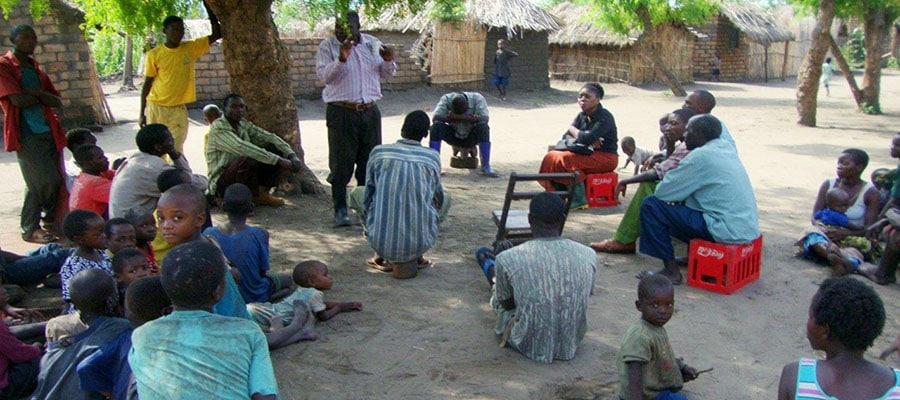Strengthening Local Epidemiological Capacity in Tanzania

FETP resident lecturing to a group of villagers on the topic of cholera in response to an outbreak in the region
CDC Tanzania Strengthens Local Epidemiological Capacity
Disease outbreaks can spread rapidly across the globe and have devastating consequences. Public health emergencies affect more than people’s health – they impact economies, destabilize geopolitical environments and impact a country’s national security. Every country needs an effective public health workforce to improve its ability to protect its citizens and rapidly detect and effectively respond to health threats and disease outbreaks. For nearly 40 years, CDC‘s Field Epidemiology Training Program (FETP), has grown to reach over 70 countries, helping to build a pool of skilled epidemiologists, or disease detectives, who use data to detect and respond to disease outbreaks.
The Tanzania Field Epidemiology and Lab Training Program (TFELTP) was established in 2008 as an advanced two-years’ master program after recognizing the need to strengthen the epidemiological capacity of Ministry of Health, Community Development, Elderly and Children (MoHCDEC). The goal of TFELTP is to produce a workforce to improve the country’s ability to conduct disease surveillance, manage national disease control and prevention programs and to enhance laboratory support for surveillance, diagnosis, treatment and monitoring. In 2015 and 2016, a three-tier TFELTP model was accomplished by establishing the Frontline and Intermediate programs. The three-tier approach is necessary to build a critical mass of field disease detectives to strengthen the epidemiologic and laboratory management capacity at every level to meet the needs of emerging diseases and ongoing public health threats.
In 2018, Tanzania celebrated the 10th anniversary of the TFELTP training program. TFELTP has maintained an epidemiology and lab track and attained international accreditation in 2018. Tanzania is the 5th country in Africa and 13th worldwide to achieve this status.
The objectives of the TFELTP program are –
- To strengthen Tanzania’s capacity to respond to public health emergencies
- To build and evaluate surveillance systems
- To provide trained laboratory managers for public health-related laboratories
- To lead applied epidemiologic research activities in priority public health problems
- To improve communications and networking among health and emergency response officials throughout Tanzania.
In 2015, Tanzania began implementing the FETP model with disease detectives from both the human and animal health sectors. Trainees are from 20 of Tanzania’s 26 regions. Graduates from all three tiers have worked with national and regional rapid response teams to investigate over 100 outbreaks and disasters.
CDC collaborates with TFELTP trainees to reach HIV epidemic control during site deployments
Since the program’s inception, TFELTP trainees have accelerated Tanzania’s progress towards HIV epidemic control. In particular, Intermediate TFELTP trainees spend ~75% of their time in field assignments to apply epidemiological skills acquired in the classroom to conduct activities aimed at enhancing HIV program outcomes. Trainees are mentored on how to evaluate surveillance systems and conduct research aimed at improving HIV outcomes in the areas they support. The results from the evaluations are shared with respective regions and districts for immediate action.
Graduates and trainees of TFELTP remain a sustainable resource for emerging issues and routine programmatic improvement. In 2017, results from a national household survey found that only 61% of persons living with HIV (PLHIV) age 15 and over in Tanzania knew their HIV status. The Kagera and Mwanza regions were estimated to have the largest number of PLHIV who were not yet diagnosed. CDC deployed staff through the Rapid Response Initiative (RRI) to both regions to quickly scaleup support activities. During the RRI, the Mwanza team worked with three TFELTP students attached to the local health governing bodies to activate, scale and sustain activities in the region.
With the local governing bodies, the RRI team adjusted TFELTP work plans and deliverables to align with the RRI’s goals, structure and approach. The objectives focused on intensifying active HIV case finding, mentoring HIV healthcare workers on how to improve retention and conducting routine data quality assessments to train and empower facility data clerks to analyze and use their own data. Additionally, the TFELTP trainees provided site-level support to government health workers on data management, testing and identification services and high viral load testing and counseling.
This collaboration allowed CDC, partners, TFELTP trainees and government officials to work together to reach objectives, and assured ownership for progress was cross-cutting throughout these different agencies. This joint-ownership inherently improves sustainability of progress. Two of the three TFELTP students the Mwanza RRI team collaborated with now work full time in regional and district surveillance roles where they continue to utilize skills from the RRI.
TFELTP acts as the backbone of Tanzania’s surveillance and response system
TFELTP graduates are tested disease detectives working to prevent potentially devastating consequences by building frontline capacity to identify and respond to emerging health threats. Currently, a majority of national and regional officers implementing the International Health Regulations (IHR) are TFELTP graduates. Additionally, TFELTP graduates are crucial to strengthening the health system for routine disease prevention and response, including but not limited to reaching HIV epidemic control. Building domestic capacity helps to prevent the next epidemic from taking root and spreading, while improving the overall response to current health challenges. CDC, in partnership with the MoHCDEC, and through the Global Health Security Agenda, are working together to ensure the country has the capacity to quickly identify and stop disease threats, while continually utilizing TFELTP to create a healthier Tanzania each day.


































No hay comentarios:
Publicar un comentario